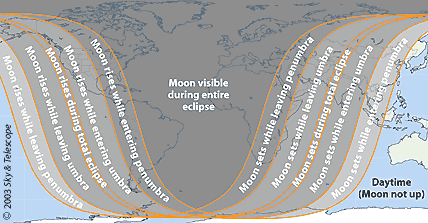
| |
 |
 During the announced total eclipse of the Moon scheduled for Nov 8, 2003, it was noted
that the eclipse was not total.
During the announced total eclipse of the Moon scheduled for Nov 8, 2003, it was noted
that the eclipse was not total.
- On Saturday night, November 8–9, the full Moon will pass through the Earth’s shadow for skywatchers throughout the Americas, Europe, Africa, and western and southern Asia. But this eclipse will be unusually brief, remaining total for only 25 minutes as the Moon skims barely inside the southern edge of our planet’s shadow.
- Sky and Telescope
But per eyewitness reports and actual photograph series posted on a Netherlands site, the lower edge was illuminated throughout! The Netherlands is squarly within the area scheduled for a total eclipse, and thus anticipated a total eclipse, no exceptions.
- The Moon will lie completely within Earth's dark shadow.
- Maansverd
Photographic evidence, also from the Netherlands, showed the eclipse, even within the dark area, not total. If the Earth were raised up in its Ecliptic, the Sun shining from the south more than expected, this would be the result!

Quotes from a message board:
Here in London its 1.20AM, which should be the totality, yet I can still see a thin crescent of full moonlight.
Yes, a brighter crescent on the lower left. I thought totality would mean 100%?
I thought totality meant 100% also. And clearly everyone saw that thin slither at the side, then at the bottom.
I observed the lunar eclipse with my telescope and was noting times with a nuclear clock. I observed on the east coast of the United States and the lunar eclipse never reached totality. This is the third total lunar eclipse that I have observed, and there is no question about it, totality was not reached. I estimate that it only reached 95 % of totality.
The illumination on the lower limb shows the lack of totality. I have observed total lunar eclipses before and during totality the entire disk is dark with zero illumination.